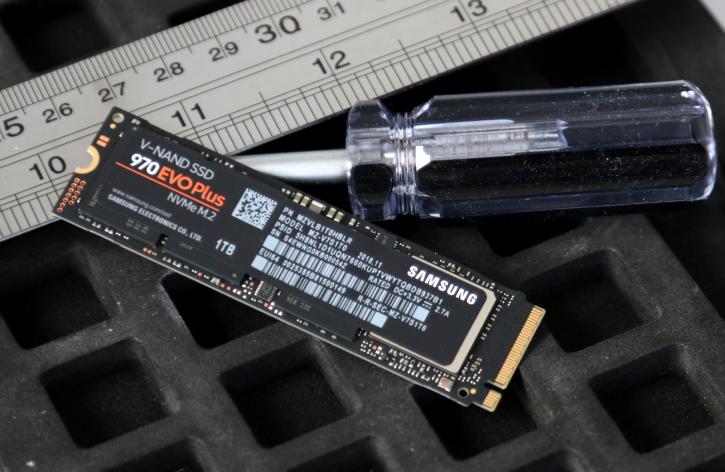Final Words & Conclusion
Final Words & Conclusion
Yep Samsung made it faster. The performance that the new Plus model is really good. Now I know we can all discuss whether you'd ever notice ~2 GB/s reads over ~3 GB/s writes but on the EVO product group it is impressive. It is also good to note that performance wise this 1TB SSD offers what is advertised as writes have gone from super fast towards super-super fast. Remember, to fully utilize the performance that is offered for this NVMe SSD you need a supporting infrastructure and this a motherboard with PCI Express Gen3 (x4) interface and NVMe ready BIOS. NVMe based storage is one the most exciting technologies that we have been following developments closely over the past few years was obviously the development curve of NAND flash-based storage technology. We moved from a "blisteringly fast" 100 MB/sec towards numbers that are 20 to 30 fold of that in the 3.5GB/sec ranges which I like to call eye-soaring.
Would you ever notice a difference between a 2.5GB/s write or one at 3.5 GB/sec (rough speeds). We honestly doubt that that's seeking within an extremely narrow margin (split second IO). Even a proper writing SATA3 SSD will offer you 98% of the performance you need and can notice. The new 64-layer NAND helps in cutting down costs, the Phoenix controller gives that little extra edge in perf and the nickel plating on top of the controller helps it bypass thermal throttling better. That last one remains is great, and actually, is the reason that you see all 2019 motherboards with a heatsink for M2 units. In relative performance numbers whether you choose an EVO or PRO honestly you'll not notice. This obviously is the big conundrum with the fastest NVMe based storage units your money can get you. I'll state this again though, with a regular proper SATA3 SSD you're already there for 98% of your (consumer) workloads as your new bottleneck is your OS and the way it manages file IO.
Your average PC aficionado or PC gamer hardly will notice any difference. But if you perform heaps of video transcoding and need fast writes, or just love to grab files over Usenet parring and unparring, within these confined lines and workloads the NVMe product will shine. For motherboards, quite honestly I wish the industry would move to SATA4 rapidly with a serious increase in broad specced bandwidth to be able to keep up with M.2 and NVMe. Regardless of these comments, as you have been able to see, the Samsung 970 series is a product that offers astonishing performance in both reads and writes relative to what you pay for it. 2 GB/s writes per seconds (sustained) is still four times as fast as any SATA3, while topping 3 GB/s reads here and there and thus more than quadrupling that number compared to a SATA3 SSD. Would you ever notice any real-world difference in-between a 950, 960 series product or a 970 Pro or Evo or Evo Plus? The EVO Plus model is offered at proper endurance numbers, depending on the model (volume size) 300 TB written is guaranteed for the tested 512GB model, 600 TBW for the tested 1TB model and that's combined with a 5-year warranty that should bring a smile to your face. If the controller or the NAND doesn't die, it would last you a decade or even two depending on your workload.
Performance
Samsung plays with the MLC moniker for naming which I wish they wouldn't, this NAND is written 3 bits per cell, that's TLC. Three bits is multiple bits as in Multi as in MLC. Really this is TLC, period. Technologies like TLC and QLC face some challenges writing more bits per cell of NAND, we noticed a dropoff in performance with mixed heavy workloads that exceed writing dozens of gigabytes continuously. After you pass that 80~85 GB of writes (and I do mean continuous sustained/linear writes minute after minute), then the SLC buffer is full and start to write directly to TLC, and then perf drops. After a few minutes or even seconds the SLC cache will have written out and boom, performance is back full speed. This, in a nutshell, is what you need to be aware of with TLC and QLC SSDs. However, the Plus still managed 1.5 GB/sec here in a worst case scenario.
Pricing
At the time of writing I had only the UK prices available, so a rough exchange rate brings the 1TB model to 270 EUR and roughly 299 USD which brings the price per GB towards 25 to 30 cents depending on your currency and local VAT:
|
970 EVO PLUS V-NAND M.2 |
|
|
|
UK MSRP |
|
PCIe Gen3. X4, NVMe 1.3 Phoenix Controller |
250GB |
MZ-V7S250BW |
SR: up to 3500MB's SW: 2300 MB/s RR QD32 : MAX250K IOPS RW QD32: 550K IOPS |
83.99 |
|
500GB |
MZ-V7S500BW |
SR: up to 3500MB's SW: 3200 MB/s * RR QD32 : MAX480K IOPS RW QD32: 550K IOPS |
121.99 |
|
|
1TB |
MZ-V7S1T0BW |
SR: up to 3500MB's SW: 3300 MB/s RR QD32 : MAX600K IOPS RW QD32: 550K IOPS |
233.99 |
|
|
2TB |
MZ-V7S2T0BW |
SR: up to 3500MB's SW: 3300 MB/s RR QD32 : MAX620K IOPS RW QD32: 560K IOPS |
457.99 |
|
This SSD writes and reads serious amounts of tiny files in a very fast fashion. We stated it before though, IOPS is not something you as a consumer should worry about too much unless you are doing a lot of database related work or create similar workloads on your PC, but this SSD certainly ranks high within this aspect. The trace tests also show exceptional performance levels, enthusiast class NVMe. Overall the series is impressive. Zoom in at both IOPS and trace performance and you'll notice that the SSD can manage serious workloads without breaking so much as a drop of sweat. So whether you write lots of small files simultaneously, copy big MKV movies or do it all together. We do need to make a remark on measured controller temperature, it runs hot under load and that can cause throttling. So please do cool down the product with a proper M2 heatsink, most motherboards supply one default these days. This is the nature of enthusiast-class M2 SSDs these days.
Concluding
The new EVO PLUS mostly offers improved write speeds. For the tested 1TB model if we compare the 970 EVO and 970 EVO PLUS, that's a 100 MB/sec on reads, but a substantial 500 MB/sec on writes. That metric won't bring anything noticeable for your game PC other than bragging rights. It, however, does make Samsung the fastest on the globe, as they squeeze out every little bit of performance the M2 on x4 can take. The throughput is insane, the writes are insane. I've mentioned it a couple of times in my reviews already, and will keep doing so; the MLC versus TLC discussion as far as I am concerned can be put to rest, SSDs with TLC NAND has proven to be extremely long-lasting and reliable thanks to the latest technologies. Samsung will give you a 5-year warranty on the 970 Plus product series (that or the TBW value whichever one comes first), and that in technology land is a nice warranty to have, hey, 5 years always is preferred. Remember, even with the slowest SATA3 SSD, you can find, the access times will make a tremendous difference as you do not have a mechanical magnetic head seeking data on platters. A 1TB unit is rated at 600 TBW. So if you write 50 GB per day x 365 days, that's 18 TB per year. 600:18,25 = 32.8 Years. Write less and this SSD can outlive you when it comes to NAND writes. In closing, if you want a seriously fast enthusiast class M.2. SSD, hey this one ends up easily in my personal top 3. But all is dependant on the pricing of course, at the time of writing this conclusion we are still waiting on the final numbers but expect something in that 25 to 30 cents per GB. What a very nice SSD series for sure, this deserves our top pick award.
Recommended Downloads



